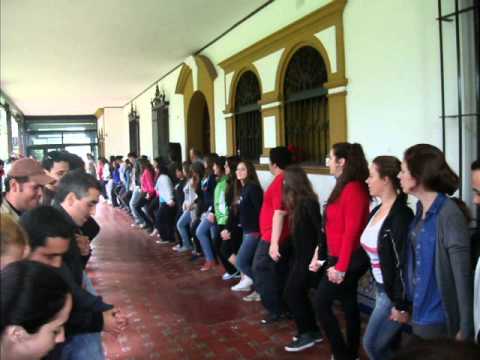Iquique, video promocional de ¡Viva Iquique! from ¡Viva Iquique! on Vimeo.
Video Opening Statement Trans: Long Live Iquique! The New Look of Iquique
By all accounts, Muslims are less that 0.025% in Chile, or around 4,000 in number out of a Chilean population approaching 18 million.
But an inordinate number of them seem to be around Iquique in Chile’s quasi-tropical1 north.
Iquique (pronounced EE-KEY-KAY) is a famous beach resort. It has a cool tropical climate which hovers around 71ºF/ 16º C, give or take a few degrees all year round. A near perfect climate.
The metro area of Iquique has roughly about 220,000 people. About 30,000 of them are Arab in ancestry, or about 15% of the local population. While this is about three times (3x) higher than the Chilean average of 5% Arabs in the population, it is still not inordinately large. Many of those Arabs would be second- or third-generation Chileans who would probably not even speak Arabic by now, and might only be half Arab.
Now, Iquique is famous for other ethnicities. There are a lot of ethnic Croatians. Australians, and Scots have retired there. But, for the purposes of this site, we are interested in the Arabs.
For a while, Iquique was famous for money laundering operations being run by Lebanese-Paraguayans who were sympathetic to Hezbollah.
Feds Call Chile Resort a Terror Hot Spot (Jewish Daily Forward)
By Marc Perelman
Published January 03, 2003IQUIQUE, Chile — The Bush administration has designated this windswept resort town and free-trade zone on Chile’s northern Pacific coast as a terrorist hot spot, second in South America only to the notorious tri-border region where Argentina, Brazil and Paraguay meet.
Indeed, American and regional officials say, Iquique — pronounced “ee-KEE-kay” — a booming free-trade zone created 30 years ago in what was once a sleepy fishing village, may be poised to compete with the tri-border area as a center of terrorism financing and support.
…
The tri-border area, with its 30,000-strong Arab community and reputation for smuggling and money-laundering, has been monitored closely by intelligence agencies during the last decade, especially following the September 11 terrorist attacks. The stepped-up law enforcement has contributed to the exodus of terrorism suspects to Chile.
Those operatives were often Shia Lebanese-Paraguayans who came from the Triple Point2 of South America, where smuggling is quite common. After the heat got turned up on them, they moved from Paraguay to Chile. They laundered money and ran protection rackets. Profits were sent back to Hezbollah in Lebanon. This was a financial operation. There was no direct threat to Chile, which was why Chile was slow to act at first.
In truth, this was possibly facilitated by the high concentration of Arabs whom they could hide among (even though almost all those Arabs were Christian who may have been uninvolved and unaware).
Now it is 10 years later since that initial report. Has anything changed?!
It seems that the Chileans have cracked down considerably.
What was most interesting is the the activity in Chile was confined primarily to financial activities. There was no direct threat to Chile.
So, if you visit Chile, be assured that you are quite safe.
Meanwhile, there are religious changes coming to Iquique.
Built in 1999 – you may have to watch it on YouTube
Recently, a Mosque has been built in Iquique. To an American or European this might not strike anyone as noteworthy, but there were no mosques at all in Chile until the 1990s – and what few Musims there were had to practice at home.
Source: Islam in Chile
WikipediaThrough the 1970s and ‘80s, there were no religious leaders or centers for praying. Muslims who maintained the faith met in the residence of Taufik Rumie’ Dalu, a trader of Syrian origin. In 1990 the construction of the Al-Salam Mosque began, the first of the country
There still may be only five or six mosques in the whole country, even today. Not a whole lot. There are now mosques in:
1) Santiago, Chile (the capital) (Click Here)
2) Viña del Mar, Chile (slightly north of the capital, lots of Palesitnians) (Click Here)
3) Iquique, Chile (In the north of Chile) (Click Here)
4) Conquimbo, Chile (In the north of Chile) (Click Here)
5) Temuco, Chile (in the south of Chile)
That seems to be it for all of Chile, though I may have missed some Islamic Aid Societies. There are more Islamic Institutions around Paterson, NJ.
Three of those towns: Viña del Mar, Coquimbo, and Iquique are (sub)tropical beach resorts, from which we learn that the Arabs settled in some of the best parts of Chile.
Viña Del Mar, Chile’s biggest beach resort
Islam cannot compete with bikinis and booze
However, if we look at it rationally, we see there is more to hope about than to fear. Northern Chile will NOT become part of the Caliphate. Five mosques for 4,000 people does not indicate a flood. What it may indicate is that some outside money is coming in; and that may be a cause for worry, but that is about it.
Remember, these Muslims (what few there are) are concentrating in areas full of good looking women with bikinis on the beach. Islam will not long hold up under those pressures.
In the end, Chile is also undergoing an Evangelical Revival. We can expect many of those Muslims, or their children, probably end up being Christian in a few decades.
Have some faith!
1Iquique is sort of tropical, but it has one of the oddest climates on the planet. It rarely goes below 60ºF / 16ºC in winter, or above 86ºF / 30ºC in summer. This is caused by two competing natural energies. The tropical sun wants to turn Iquique into a jungle, but just offshore is the cold Humboldt Current which brings cold water up from Antarctica and moderates the heat.
The bizarre consequence is that Iquique is about 71ºF / 22ºC all year round +/- 10ºF / 6ºC depending on whether it is winter or summer. The tropical sun evaporates just enough water from the ocean that the humidity is about 70% all year, but the sun almost never evaporates enough water that it rains. Iquique is one of the driest places in the planet, but you can get mists near the shore. It is one of the nicest climates on the planet, and should be hotter; but the cold offshore current keeps Iquique in a sort of cool tropical climate.
The water at the beach might be warm; but a mile offshore where the Humboldt Current kicks in, it can get quite cooler.
2The Triple Frontier is a border area in South America where Brazil, Argentina, and Paraguay meet. It is famous for drug smugglers, counterfeit luxury items, and terrorists, as well as cheap goods.
Posted on YouTube: Jan 12, 2017
Caution: From a Chinese source
There is a city, Ciudad del Este (on the Paraguayan side), which is a free market zone, and is notorious for shady dealing. Paraguay has weak smuggling laws. Ciudad del Este is a Wild West sort of place where anything goes.
Hezbollah operatives have been caught in the Paraguayan side.
It is believed that in 1994 the Iranians ran a squad out of the Triple Point which was responsible for the bombing of the AMIA Jewish Center in Chile.
The USA, and South American nations, are trying to control the area; but the jungle makes it impossible to completely get a handle on smugglers; though some progress has been made.
September 2, 2020 – Made mobile friendly, replaced a dead video, and made some edits.
January 18, 2025 – Edited: Updated a citation. Made corrections.




